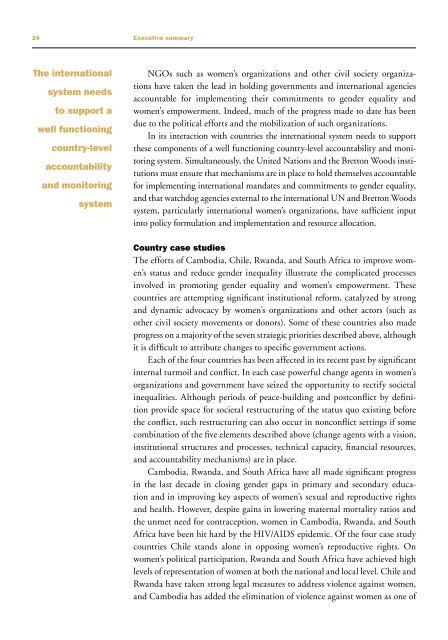Taking action: achieving gender equality and empowering women
Taking action: achieving gender equality and empowering women
Taking action: achieving gender equality and empowering women
Create successful ePaper yourself
Turn your PDF publications into a flip-book with our unique Google optimized e-Paper software.
24 Executive summary<br />
The international<br />
system needs<br />
to support a<br />
well functioning<br />
country-level<br />
accountability<br />
<strong>and</strong> monitoring<br />
system<br />
NGOs such as <strong>women</strong>’s organizations <strong>and</strong> other civil society organizations<br />
have taken the lead in holding governments <strong>and</strong> international agencies<br />
accountable for implementing their commitments to <strong>gender</strong> <strong>equality</strong> <strong>and</strong><br />
<strong>women</strong>’s empowerment. Indeed, much of the progress made to date has been<br />
due to the political efforts <strong>and</strong> the mobilization of such organizations.<br />
In its inter<strong>action</strong> with countries the international system needs to support<br />
these components of a well functioning country-level accountability <strong>and</strong> monitoring<br />
system. Simultaneously, the United Nations <strong>and</strong> the Bretton Woods institutions<br />
must ensure that mechanisms are in place to hold themselves accountable<br />
for implementing international m<strong>and</strong>ates <strong>and</strong> commitments to <strong>gender</strong> <strong>equality</strong>,<br />
<strong>and</strong> that watchdog agencies external to the international UN <strong>and</strong> Bretton Woods<br />
system, particularly international <strong>women</strong>’s organizations, have sufficient input<br />
into policy formulation <strong>and</strong> implementation <strong>and</strong> resource allocation.<br />
Country case studies<br />
The efforts of Cambodia, Chile, Rw<strong>and</strong>a, <strong>and</strong> South Africa to improve <strong>women</strong>’s<br />
status <strong>and</strong> reduce <strong>gender</strong> in<strong>equality</strong> illustrate the complicated processes<br />
involved in promoting <strong>gender</strong> <strong>equality</strong> <strong>and</strong> <strong>women</strong>’s empowerment. These<br />
countries are attempting significant institutional reform, catalyzed by strong<br />
<strong>and</strong> dynamic advocacy by <strong>women</strong>’s organizations <strong>and</strong> other actors (such as<br />
other civil society movements or donors). Some of these countries also made<br />
progress on a majority of the seven strategic priorities described above, although<br />
it is difficult to attribute changes to specific government <strong>action</strong>s.<br />
Each of the four countries has been affected in its recent past by significant<br />
internal turmoil <strong>and</strong> conflict. In each case powerful change agents in <strong>women</strong>’s<br />
organizations <strong>and</strong> government have seized the opportunity to rectify societal<br />
inequalities. Although periods of peace-building <strong>and</strong> postconflict by definition<br />
provide space for societal restructuring of the status quo existing before<br />
the conflict, such restructuring can also occur in nonconflict settings if some<br />
combination of the five elements described above (change agents with a vision,<br />
institutional structures <strong>and</strong> processes, technical capacity, financial resources,<br />
<strong>and</strong> accountability mechanisms) are in place.<br />
Cambodia, Rw<strong>and</strong>a, <strong>and</strong> South Africa have all made significant progress<br />
in the last decade in closing <strong>gender</strong> gaps in primary <strong>and</strong> secondary education<br />
<strong>and</strong> in improving key aspects of <strong>women</strong>’s sexual <strong>and</strong> reproductive rights<br />
<strong>and</strong> health. However, despite gains in lowering maternal mortality ratios <strong>and</strong><br />
the unmet need for contraception, <strong>women</strong> in Cambodia, Rw<strong>and</strong>a, <strong>and</strong> South<br />
Africa have been hit hard by the HIV/AIDS epidemic. Of the four case study<br />
countries Chile st<strong>and</strong>s alone in opposing <strong>women</strong>’s reproductive rights. On<br />
<strong>women</strong>’s political participation, Rw<strong>and</strong>a <strong>and</strong> South Africa have achieved high<br />
levels of representation of <strong>women</strong> at both the national <strong>and</strong> local level. Chile <strong>and</strong><br />
Rw<strong>and</strong>a have taken strong legal measures to address violence against <strong>women</strong>,<br />
<strong>and</strong> Cambodia has added the elimination of violence against <strong>women</strong> as one of

















